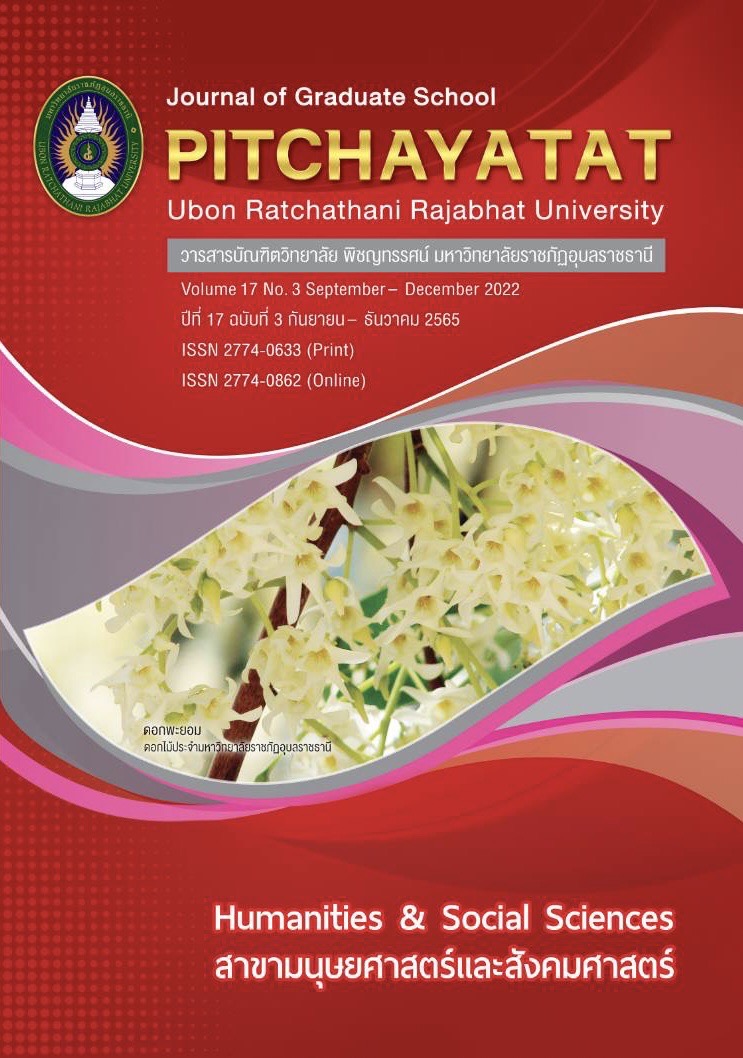รูปแบบวัฒนธรรมคุณภาพของสถานศึกษาสังกัดสำนักงานเขต พื้นที่การศึกษาประถมศึกษาในจังหวัดศรีสะเกษ
คำสำคัญ:
รูปแบบวัฒนธรรมคุณภาพ, สถานศึกษา, สำนักงานเขตพื้นที่การศึกษาประถมศึกษาในจังหวัดศรีสะเกษบทคัดย่อ
การวิจัยนี้มีวัตถุประสงค์เพื่อ 1) ศึกษาสภาพความต้องการและแนวทางในการพัฒนารูปแบบวัฒนธรรมคุณภาพของสถานศึกษา 2) สร้างรูปแบบวัฒนธรรมคุณภาพของสถานศึกษา และ 3) ประเมินรูปแบบวัฒนธรรมคุณภาพของสถานศึกษา สังกัดสำนักงานเขตพื้นที่การศึกษาประถมศึกษาในจังหวัดศรีสะเกษ การวิจัยแบ่งออกเป็น 3 ระยะ ระยะที่ 1 การศึกษาสภาพความต้องการและแนวทางในการพัฒนารูปแบบวัฒนธรรมคุณภาพ ของสถานศึกษาตัวอย่าง เป็นผู้บริหารสถานศึกษา 265 คน และครู 368 คน โดยใช้วิธีสุ่มตัวอย่างแบบแบ่งชั้นภูมิ ระยะที่ 2 การสร้างรูปแบบวัฒนธรรมคุณภาพ ของสถานศึกษา การวิพากษ์ร่างรูปแบบและคู่มือวัฒนธรรมคุณภาพของสถานศึกษาใช้การประชุมสนทนากลุ่ม กลุ่มเป้าหมายเป็นผู้ทรงคุณวุฒิจำนวน 12 คน ได้มาโดยเลือกแบบเจาะจง ระยะที่ 3 การประเมินรูปแบบวัฒนธรรมคุณภาพของสถานศึกษา กลุ่มเป้าหมายเป็นผู้ทรงคุณวุฒิจำนวน 17 คน เครื่องมือที่ใช้ในการวิจัย แบบสอบถาม แบบบันทึกข้อมูลและสังเคราะห์ข้อมูลที่ได้จากข้อเสนอแนะ แบบประเมินรูปแบบ สถิติที่ใช้ใน คือ ค่าเฉลี่ย ส่วนเบี่ยงเบนมาตรฐาน
ผลการวิจัยพบว่า
- สภาพความต้องการรูปแบบวัฒนธรรมคุณภาพ ของสถานศึกษาโดยรวมอยู่ในระดับมากที่สุด (x̅= 4.71) และแนวทางในการพัฒนา ทั้ง 6 ด้าน โดยเรียงจากค่าเฉลี่ยมากไปหาน้อย ดังนี้ การยกย่องและการให้รางวัลการจัดการเชิงกลยุทธ์ ภาวะผู้นำคุณภาพ การพัฒนาทรัพยากรมนุษย์ การทำงานเป็นทีม และการปรับปรุงอย่างต่อเนื่อง ส่วนแนวทางในการพัฒนาใช้ภาวะผู้นำขับเคลื่อนวัฒนธรรมคุณภาพโดยการมีส่วนรวมและเสริมแรงเชิงบวก
- รูปแบบวัฒนธรรมคุณภาพของสถานศึกษาที่สร้างขึ้นได้ คือ ภาวะผู้นำคุณภาพ การทำงานเป็นทีม การยกย่องและการให้รางวัล การจัดการเชิงกลยุทธ์ การพัฒนาทรัพยากรมนุษย์และด้านการปรับปรุงอย่างต่อเนื่อง
- ผลการประเมินรูปแบบวัฒนธรรมคุณภาพของสถานศึกษาโดยภาพรวมด้านความเหมาะสม ด้านความเป็นไปได้ และด้านความเป็นประโยชน์อยู่ในระดับมากที่สุด
เอกสารอ้างอิง
เขตพื้นที่การศึกษาประถมศึกษา, สำนักงาน” ศึกษาศาสตร์มหาวิทยาลัยนเรศวร. 19, 2 (เมษายน–มิถุนายน 2560): 264-265.
คชธร คชพันธ์ และจุมพจน์ วนิชกุล. “การพัฒนารูปแบบการบริหารวัฒนธรรมคุณภาพ สำหรับโรงเรียนประถมศึกษาม,” บริหารการศึกษา มศว. 14, 26 (มกราคม-มิถุนายน 2560): 21-22.
ชาญณรงค์ พรรุ่งโรจน์. วัฒนธรรมคุณภาพ: สร้างคน สร้างชาติ. กรุงเทพฯ: ซีโน พับลิชชิ่ง แอนด์ แพคเกจจิ้ง. 2557.
ดาวรุวรรณ ถวิลการ. “รูปแบบการพัฒนาวัฒนธรรมคุณภาพของโรงเรียนขนาดเล็กในภาคตะวันออกเฉียงเหนือ,” วิจัยมหาวิทยาลัยขอนแก่นแก่น (ฉบับบัณฑิตศึกษา) สาขามนุษยศาสตร์และสังคมศาสตร์. 6, 3 (มกราคม–มิถุนายน 2561): 56-66.
ดาวรุวรรณ ถวิลการ. วัฒนธรรมองค์การในโรงเรียน รางวัลพระราชทาน: การวิจัยเชิงชาติพันธุ์วรรณนา. วิทยานิพนธ์ปรัชญาดุษฎีบัณฑิต มหาวิทยาลัยขอนแก่น, 2563.
นิจฉัย ชาติชวนชม. การลดข้อบกพร่องสีพิมพ์ไม่ตรงมาตรฐานโดยการปรับเปลี่ยนวัฒนธรรมคุณภาพ. วิทยานิพนธ์วิศวกรรมศาสตรมหาบัณฑิต มหาวิทยาลัยเทคโนโลยีพระจอมเกล้าธนบุรี. 2552.
บุญชม ศรีสะอาด. การวิจัยเบื้องต้นฉบับปรับปรุงใหม่. พิมพ์ครั้งที่ 9. กรุงเทพฯ: สุวีริยาสาส์น, 2556.
ภัทร์ธมณฑน์ เรืองวิทยาวุฒิ. “คุณลักษณะความเป็นผู้นำของผู้บริหารสถานศึกษาในศตวรรษที่ 21,” วิทยาลัยบัณฑิตเอเชีย. 6, 1 (มกราคม–มิถุนายน 2559): 129-135.
เยาวลักษณ์ มหาสิทธิวัฒน์ และปัณณธร ชัชวรัตน์. “กลยุทธ์การพัฒนาวัฒนธรรมคุณภาพการศึกษาของอาจารย์วิทยาลัยพยาบาลในสังกัดสถาบันพระบรมราชชนก,” มหาวิทยาลัยราชภัฏยะลา. 2, 2 (กรกฎาคม-ธันวาคม 2550): 126-138.
เรืองวิทย์ เกษสุวรรณ. การจัดการคุณภาพ: จาก TQC ถึง TQM, ISO 9000 และการประกันคุณภาพ. กรุงเทพฯ: บพิธการพิมพ์, 2545.
เลขาธิการสภาการศึกษา, สำนักงาน. แผนการศึกษาแห่งชาติ พ.ศ. 2560-2579. กรุงเทพฯ: พริกหวานกราฟฟิค, 2560.
วราภรณ์ ตระกูลสฤษธิ์. การทำงานเป็นทีม. กรุงเทพฯ: ศูนย์ส่งเสริมวิชาการ, 2549.
วีณา พึงวิวัฒน์นิกุล. เอกสารประกอบการบรรยายกระบวนวิชาการจัดการทรัพยากรมนุษย์ร่วมสมัย. กรุงเทพฯ: มหาวิทยาลัยรามคำแหง, 2561.
สมคิด สกุลสถาปัตย์. “กลยุทธ์การสร้างวัฒนธรรมคุณภาพในการบริหารจัดการสถานศึกษาขั้นพื้นฐาน,” มหาวิทยาลัยกรุงเทพธนบุรี. 8, 1 (กรกฎาคม-ธันวาคม 2563): 277-283.
สมชาย เทพแสง. “กลยุทธ์ในการสร้างแรงบันดาลใจของผู้นำร่วมสมัย,” บริหารการศึกษา มศว,14, 27 (มกราคม–เมษายน 2560): 165-172.
สุเขตร์ ศรีบุญเรือง. การพัฒนาตัวบ่งชี้วัฒนธรรมคุณภาพของสถานศึกษา ระดับมัธยมศึกษา สังกัดสำนักงานคณะกรรมการการศึกษาขั้นพื้นฐาน. วิทยานิพนธ์ปรัชญาดุษฎีบัณฑิต มหาวิทยาลัยราชภัฏมหาสารคาม. 2561.
สุพล จันต๊ะคาด และฉลอง ชาตรูประชีวิน. “รูปแบบการส่งเสริมวัฒนธรรมคุณภาพของสถานศึกษา สังกัดสำนักงานเขตพื้นที่การศึกษาประถมศึกษา,” ศึกษาศาสตร์มหาวิทยาลัยนเรศวร. 19, 2 (เมษายน–มิถุนายน 2560): 264-265.
Parker. Organizational Theory Design and Change. New Jersey: Pearson Education, 2007.
Joyce, B. and E. Colboun. Model of Professional Development Methodology and Educators. London: Corwin A Sage Company, 2010.
Long, T. S. Race and Cultural Backgrounds of School Leaders and their Approach to Cultural Awareness within PK-12 Schools. United States Code: Cabrini University, 2020.
ดาวน์โหลด
เผยแพร่แล้ว
รูปแบบการอ้างอิง
ฉบับ
ประเภทบทความ
สัญญาอนุญาต
ลิขสิทธิ์ (c) 2021 วารสารบัณฑิตวิทยาลัย พิชญทรรศน์ มหาวิทยาลัยราชภัฏอุบลราชธานี

อนุญาตภายใต้เงื่อนไข Creative Commons Attribution-NonCommercial-NoDerivatives 4.0 International License.
บทความทุกเรื่องได้รับการตรวจความถูกต้องทางวิชาการโดยผู้ทรงคุณวุฒิภายนอกอย่างน้อย 3 คน ความคิดเห็นในวารสารพิชญทรรศน์เป็นความคิดเห็นของผู้นิพนธ์มิใช่ความคิดเห็นของผู้จัดทำ จึงมิใช่ความรับผิดชอบของวารสารพิชญทรรศน์ และบทความในวารสารพิชญทรรศน์สงวนสิทธิ์ตามกฎหมายไทย การจะนำไปเผยแพร่ต้องได้รับอนุญาตเป็นลายลักษณ์อักษรจากกองบรรณาธิการ





